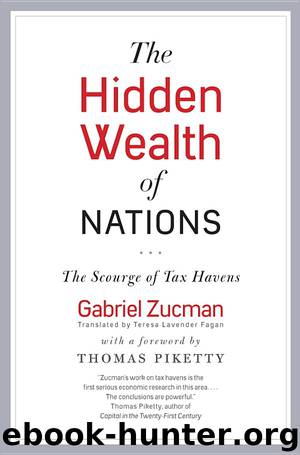The Hidden Wealth of Nations: The Scourge of Tax Havens by Gabriel Zucman

Author:Gabriel Zucman [Zucman, Gabriel]
Language: eng
Format: epub
ISBN: 9780226245560
Publisher: The University of Chicago Press
Published: 2015-08-19T16:00:00+00:00
Foreign Account Tax Compliance Act
Fortunately, at the time the OECD went for on-demand information exchange, the United States started exploring an alternative, more meaningful strategy. In 2010 Congress passed and President Obama signed into law the Foreign Account Tax Compliance Act. FATCA imposes an automatic exchange of data between foreign banks and the Internal Revenue Service. Financial institutions throughout the world must identify who, among their clients, are American citizens and inform the IRS what each person holds in his or her account and the income earned on it. There is no requirement for prior suspicion: the exchange of data has to be automatic, every year, just like US banks automatically send information to the IRS to ensure that taxes on interest income, dividends, and capital gains are properly paid.
The Foreign Account Tax Compliance Act has been criticized on a number of grounds. FATCA, some argue, asserts US government power over foreign-based financial firms; it invades privacy; and the US government does not require reciprocal reporting to other countries regarding assets held by foreign households in US banks. Above all, it creates difficulties for ordinary Americans overseas because foreign banks may choose simply not to offer or to sharply limit accounts to Americans rather than deal with the FATCA requirements. Some of these issues have merits. In particular, there is a real risk that FATCA will impose substantial administrative burdens on many law-abiding US taxpayers and the financial institutions that serve them, while at the same time failing to catch the most aggressive tax dodgers. Notwithstanding, FATCA has been the starting point toward changing the ground rules that previously governed offshore banking.
The key provision of FATCA is that foreign banks refusing to disclose accounts held by US taxpayers face clearly defined economic sanctions: a 30% tax on all dividends and interest income paid to them by the United States. That threat has proven effective in securing the (formal) cooperation of most of the world’s tax havens and financial institutions (whether real cooperation will ensue is less clear, as we shall see). Some large countries were initially skeptical—the Chinese authorities publicly criticized the American law, before halfheartedly praising automatic exchanges in the summer of 2013. And there are still today some cracks in the edifice: in places like Lebanon and Uruguay, one can still have accounts in banks that are not registered as FATCA compliant. But by and large, the 30% withholding tax has acted as a powerful-enough deterrent. This episode teaches us a second important lesson: apparently, tax havens can be forced to cooperate if threatened with large-enough penalties.
Download
This site does not store any files on its server. We only index and link to content provided by other sites. Please contact the content providers to delete copyright contents if any and email us, we'll remove relevant links or contents immediately.
International Integration of the Brazilian Economy by Elias C. Grivoyannis(111057)
The Radium Girls by Kate Moore(12028)
Turbulence by E. J. Noyes(8047)
Nudge - Improving Decisions about Health, Wealth, and Happiness by Thaler Sunstein(7706)
The Black Swan by Nassim Nicholas Taleb(7129)
Rich Dad Poor Dad by Robert T. Kiyosaki(6632)
Pioneering Portfolio Management by David F. Swensen(6300)
Man-made Catastrophes and Risk Information Concealment by Dmitry Chernov & Didier Sornette(6019)
Zero to One by Peter Thiel(5801)
Secrecy World by Jake Bernstein(4752)
Millionaire: The Philanderer, Gambler, and Duelist Who Invented Modern Finance by Janet Gleeson(4478)
The Age of Surveillance Capitalism by Shoshana Zuboff(4292)
Skin in the Game by Nassim Nicholas Taleb(4248)
The Money Culture by Michael Lewis(4207)
Bullshit Jobs by David Graeber(4190)
Skin in the Game: Hidden Asymmetries in Daily Life by Nassim Nicholas Taleb(4004)
The Dhandho Investor by Mohnish Pabrai(3764)
The Wisdom of Finance by Mihir Desai(3746)
Blockchain Basics by Daniel Drescher(3581)
